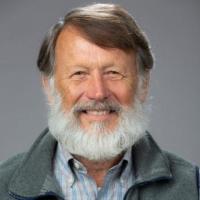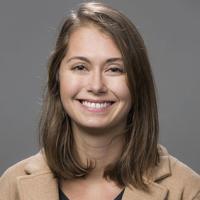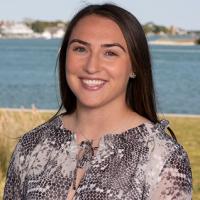Plastic Pollution Working Group Members
Faculty

Liz DeMattia
I am an ecologist at the Nicholas School of the Environment who is interested in the intersection of science and community. I am currently working on issues of plastic pollution education from a marine debris perspective and a stormwater/microplastic perspective. I have written curricula regarding marine debris (elementary) and community science and microplastics (high school) and collaborate with researchers at the EE lab of NCSU to study the role of intergenerational learning in changing perspectives on plastic pollution.
Kids’ Presentations Sway Local Leaders’ and Voters’ Attitudes on Ocean Plastics Pollution (article)
Q&A: MEM Students Discuss Why They Got Involved in STEM Education Outreach (article)
Duke Marine Lab Science Outreach With Boys & Girls Club (YouTube video)
Duke Marine Lab Community Science Program on Twitter: ![]() dumlcommunity
dumlcommunity

Meagan Dunphy-Daly
Dr. Dunphy-Daly’s research focuses on the role of policy and technology in reducing marine plastic pollution. She is interested in how regulations for other pollutants have led to improved technology and how we can apply these frameworks to the plastic pollution pandemic. Dr. Dunphy-Daly co-lead a Bass Connections team on the bioremediation of plastic pollution to conserve marine biodiversity, and she works to engage students in research aimed at ways to reduce the human impact on our marine environment.

Nishad Jayasundara
My lab is interested in micro and nano plastic toxicity to aquatic organisms, with a particular focus on fish.

Michelle Nowlin
Michelle’s research is focused on understanding the sources and impacts of plastic debris on aquatic and marine environments and human health, and developing policies and regulatory mechanisms to address and reduce those impacts. Much of her client-based work focuses on mechanisms for upstream communities that reduce waste at the source.

Andrew Read
Dr. Read's research interests are in the conservation biology of long-lived marine vertebrates, particularly marine mammals, seabirds and sea turtles. Much of his current research documents the effects of human activities on populations of these species and attempts to find solutions to such conflicts. This work involves field work, experimentation and modeling. He is particularly interested in the development and application of new conservation tools. Dr. Read serves as a faculty contributor for the Bass Connections Team Bioremediation of Plastic Pollution to Conserve Marine Biodiversity.

Daniel Rittschof
Dr. Rittschof’s research is focused on the toxicology and physiological impacts on marine animals of molecules leaching from plastics, the flavors of plastics that cause plastics to be consumed, the impacts of consumption on animals eating plastic and the role of plastics as platforms for delivery of biologically active molecules to animals and for removal of biologically active molecules from animals. The lab’s goal is to inform policy and manufacturing processes.

Thomas Schultz

Jason Somarelli
Dr. Somarelli’s team is trying tackle the plastic waste pandemic in the following ways: 1) developing new enzymes and microbial systems to biodegrade plastic, 2) using bioinformatics to identify enzymes with plastic degrading capability, 3) understanding the influence of plastic ingestion as a carrier of environmental toxins, and 4) engaging students in research aimed at improving societal understanding of humanity's negative impacts on the environment and human health.

John Virdin
Amy Pickle, J.D. and Dr. John Virdin are interested in studying how governments have or can design effective public policy responses to the problem, including:
- Empirical analysis of public policy responses in different contexts
- Global monitoring and tracking of public policy responses and evidence for their effects
- Translating public policy responses into projected reductions in mismanaged plastic waste
Additionally, they are interested in the role that large corporations can play in governance of plastics use, including:
- Empirical analysis of large corporate responses to the plastic pollution problem and evidence for effects
- How large corporations are organizing to address the problem
Staff

Miranda Bernard
Miranda Bernard (she/her) is a marine social scientist who is currently a postdoc in the Ocean Synthesis Lab. She is interested in studying the dynamics between conservation interventions and community members. Her prior work has focused on community perceptions, the role of community engagement in marine protected area management, plastic pollution interventions from the local to a global scale, and the impacts of fisheries certifications on ecosystem services.

Melissa Chernick
I study how plastics of differing sizes, shapes, and compositions affect fish. I am particularly interested in morphologic changes resulting from plastic exposure and how these structural alterations affect the function of organs and tissues in order to understand impacts on whole organism health.

Zoie Diana
Zoie Diana, Ph.D., is an interdisciplinary scholar and sustainability scientist interested in environmental risks posed by marine plastic pollution and societal responses to this global conservation issue. Zoie recently earned her Ph.D. in multisector mitigation of plastic pollution in the Marine Science and Conservation Division and Integrated Toxicology and Environmental Health Program at Duke University. During this time, she conducted research with colleagues at the Nicholas Institute for Energy, Environment & Sustainability and the Environmental Law and Policy Clinic. She is a Liber Ero Postdoctoral Fellow at the University of Toronto with partners at Ocean Conservancy and the Ontario Ministry of the Environment. Before earning her Ph.D., Zoie earned her Master of Coastal Environmental Management from Duke University and her Bachelor of Science with a double major in Environmental Science and Philosophy from Allegheny College. Her research has been published in journals like One Earth, Environment International, and Environmental Science & Policy and featured in media outlets such as The Hill, The Guardian, and Popular Science.
Students

Greg Merrill
Greg's research focuses on the impacts of microscopic plastic pollution on Earth's largest animals, marine mammals. His background in aquatic toxicology and foraging ecology informs his current work understanding where microplastics may end up in a whale's body once ingested and subsequently how this may jeopardize metabolic function. Greg leverages a variety of field and laboratory techniques to identify, quantify, and characterize plastics impacting marine mammals including in-vitro toxicity assays, biopsy sampling, RNA-sequencing, Raman spectroscopy, and microwave assisted extraction pyrolysis-gas chromatography-mass spectrometry.
Alums

Anne-Elisabeth Baker
Anne-Elisabeth’s research interests are focused around design and policy interventions to reduce plastic waste. Her background in industrial design has informed her interest in material circularity and end-of-life. She hopes to continue to explore the intersections of design, policy, and environmental justice.

Mollie Bowness
While studying at the Nicholas School, Mollie has taken several courses on oceans focusing on plastic pollution and prevention. She hopes to apply her studies to the private sector, specifically in finding ways to reduce plastic in traditional packaging within the United States.

Jessica Brooks
My current research examines the impacts of plastic leachates on soil microbiomes and their nitrification and mineralization capabilities. Additional interests include exploring forest byproducts as possible alternatives to plastic food packaging as well as understanding the impacts of plastic pollution on aquatic and terrestrial ecosystems and human communities.

Kim Corcoran
My research primarily focuses on marine mammal and marine protected species conservation and currently work in a regulatory role protecting these species. While at Duke, I participated in the ‘Bioremediating Plastic Pollution to Conserve Marine Biodiversity’ Bass Connections team, working on a paper that looks at how technology-forcing policy mechanisms could be used to reduce plastic pollution.

Michaela Gates
As a PADI Divemaster and a researcher at the Nicholas School of the Environment, Michaela seeks to understand the implications of microplastics within our ecosystems and how they impact animal health and human health. She is currently working with Zoie Diana to research how microplastics consumption affects the microbiome of sea anemones. Michaela is an undergraduate in the Trinity School of Arts and Sciences majoring in Computer Science and minoring in Biology.

Niki E. Lisi
As a graduate student in Duke's Coastal Environmental Management program, Niki joined Duke Bass Connections as a member of the Bioremediation of Plastic Pollution to Conserve Marine Biodiversity project team. While working with this group, Niki primarily focused on examining how technology-forcing mechanisms within the Clean Air Act and Clean Water Act were used to decrease historical pollutants.This work, in combination with other strategic reviews, will be used to inform policy recommendations for reducing plastic pollution. After graduating from Duke in 2021, Niki joined the National Oceanic and Atmospheric Association Fisheries Office of Protected Resources, where she currently works as their North Atlantic right whale Coordinator. Although Niki's work revolves around right whales and policy to reduce the threat of vessel strikes and entanglements to the species, she remains interested in plastic pollution and the Plastic Pollution Working Group. She is particularly interested in plastic marine debris, and derelict fishing gear and their effects on marine protected species.

Jenna Seagle
Jenna is the Program Manager of the Plastic Pollution Working Group. In this role, she coordinates working group research and outreach activities. She is researching pathways towards global sustainability for plastic pollution. She is also co-lead of Duke Restore’s Coral Team. Jenna is interested in the intersection of these two positions looking at the effects of microplastics on corals. Her prior, undergraduate research has focused on the intersection of international policy and marine plastic pollution.
